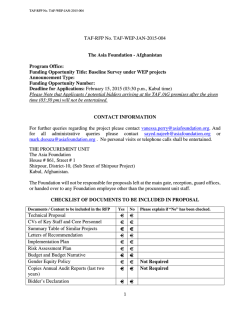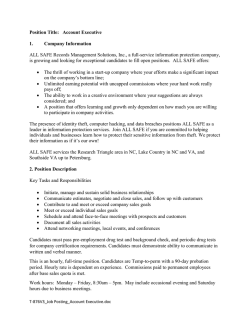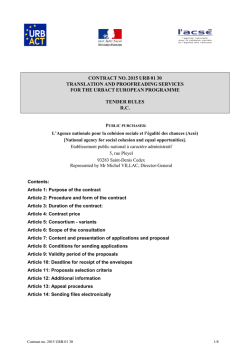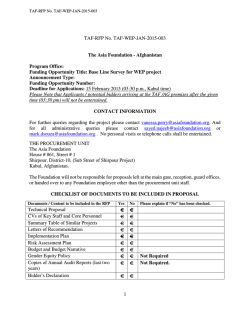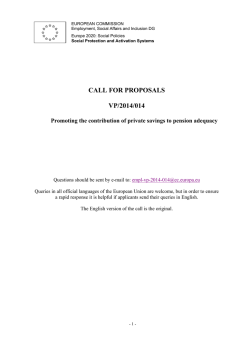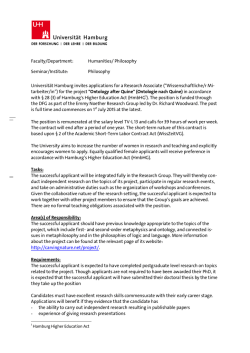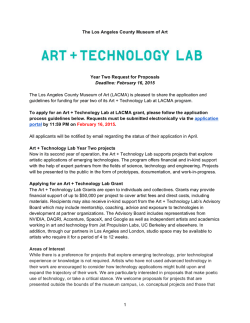
Innovational Research Incentives Scheme - Vici
Call for proposals Innovational Research Incentives Scheme Vici 2015 The Hague, January 2015 Netherlands Organisation for Scientific Research 2 Chapter 1: Introduction / Innovational Research Incentives Scheme Call for proposals - Vici Contents 1 2 3 4 5 Introduction 1 1.1 Background 1 1.2 Available budget 1 1.3 Validity of the call for proposals 1 Aim 2 2.1 Vici target group 2 2.2 Promoting female researchers 2 2.3 Knowledge utilisation 3 2.4 Data management Guidelines for applicants 3 4 3.1 Who can apply 4 3.2 What can be applied for 5 3.3 When can applications be submitted 5 3.4 Preparing an application 6 3.5 Specific conditions 6 3.6 Submitting an application 7 Assessment procedure 4.1 Procedure 4.2 Criteria Contact points and other information 8 8 10 12 5.2 Complaints and Objections 12 5.3 Contact addresses of approved institutions 13 The original Dutch-language text of the brochure is the authoritative version. Where the English-language text is open to a different interpretation, no additional rights may be derived from it. 1 Chapter 1: Introduction / Innovational Research Incentives Scheme Call for proposals - Vici 1 Introduction 1.1 Background ‘Veni, vidi, vici’ means ‘I came, I saw, I conquered’. It is a quotation from a note sent by the famous Roman general Julius Caesar to notify the Senate of his lightning victory over Pontus (in 47 BC). In 2000, NWO joined forces with the Royal Netherlands Academy of Arts and Sciences (KNAW) and the Dutch universities to establish the Innovational Research Incentives Scheme. Every year NWO is able to offer grants under the scheme to over 250 talented researchers, giving them the opportunity to develop their talents in a way that would otherwise be impossible for many of them. The programme includes three types of grant (Veni, Vidi and Vici). Each type has one call per year. Changes to the procedures may be made from year to year, depending,for example, on the results of interim evaluations. Each type of grant will have its own call for proposals. Since the 2012 funding round, the assessment of the Vici proposals has taken place in a science-wide procedure. NWO has chosen this approach because we want to award funding to the best proposals irrespective of the applicant's discipline, instead of allocating the limited funding available (about 30 positions) in advance to the different scientific domains. This ambition does, however, present the applicants with a challenge: they must not only convince committee members from their own discipline about the quality of the proposal but also committee members who work in other disciplines. Moreover, such a procedure requires a particularly meticulous approach from both the committee and NWO. Justice must be done to the differences between disciplines with respect to research traditions and output. Only then can a good comparison be made. We therefore refine our procedure each year based on what we have learnt from previous funding rounds. The current Call for the 2015 round was published online before the decision on the 2014 round was taken. As a consequence we have not been able to conclude our evaluation of the assessment procedure before publishing this Call. Because of this NWO makes the reservation that if the results of this evaluation are such that we feel adjustments need to be made to the assessment procedure for the full proposals (to be submitted in August) we will make those necessary adjustments. We will communicate any adjustments no later than early April (just after the deadline for pre-proposals), via a letter to the applicants and updated information on the website. 1.2 Available budget A total budget of 150,000,000 euros is available for the Innovational Research Incentives Scheme funding round in 2015. For the Vici round 47,400,000 million euros is available. With this budget we can fund approximately 31 positions. 1.3 Validity of the call for proposals This call for proposals is valid for the Vici funding round 2015. 2 Chapter 2: Aim / Innovational Research Incentives Scheme Call for proposals - Vici 2 Aim The aim of the Innovational Research Incentives Scheme is to promote innovation in academic research and to provide encouragement for individual postdoctoral researchers1 at various stages of their careers. The influx and promotion of talented researchers is vitally important for universities. Providing creative opportunities for adventurous, talented, pioneering researchers to do research of their own choice and to encourage them to make a permanent career of academic research are therefore key aims of the Innovational Research Incentives Scheme. The individual grants give the researchers concerned the opportunity to develop their own innovative lines of research that can be structurally embedded within a research institution. 2.1 Vici target group The Vici target group consists of excellent researchers with a striking and original talent as well as a considerable fascination for doing challenging and pioneering, research. The focus in this respect is on innovative and curiosity-driven research. In view of the purpose of the Vici programme, it is obviously essential that candidates should have the ability to formulate and conduct a line of scientific research independently. This implies that they will already have proved their abilities in the field of research. The Vici scheme is aimed at the excellent senior researcher who has successfully demonstrated the ability to develop his/her own innovative line of research and the ability to act as a coach for young researchers. Researchers working at a foreign institution are also eligible to submit an application. If awarded, the project must be carried out at a Dutch institution recognised by NWO. The Vici funding focuses on candidates who will be among the top 10 percent of their peer group, irrespective of their nationality or research topic. It is expected that they can also convince others of the originality and potential of their ideas. 2.2 Promoting female researchers Female researchers are especially urged to apply. The representation and advancement of women in academia is unfortunately far less than that of men. NWO and the Dutch Ministry for Education, Culture and Science are committed to rectifying this situation and hope that the KNAW, the Association of Universities in the Netherlands (VSNU) and the Dutch universities will also strive to reach a percentage of female applicants which is at least comparable to that the percentage of female researchers in the target group. NWO strives towards success rates for female applicants both on average and in the medium-term as high as those for male candidates. In case of an ex aequo prioritisation of two or more applications, preference is given to the application of a female applicant. 2.2.1 Aspasia The Vici rounds of the Innovational Research Incentives Scheme are linked to the Aspasia premium scheme. Through this scheme premiums of 100,000 euros are made available to university executive boards who promote female Vici laureates to 1 In this brochure, the term ‘researchers’ refers to people of either sex. 3 Chapter 2: Aim / Innovational Research Incentives Scheme Call for proposals - Vici a full professorship within one year of the grant being awarded. Aspasia has also been open to female applicants who were qualified as very good to excellent in the interview phase but who ultimately did not receive a grant. Executive boards receive a premium of 200,000 euros for promoting these applicants. The specific conditions for the awarding of the premium can be found on the Aspasia website (www.nwo.nl/aspasia). Female laureates who are eligible for the premium will be informed of this by NWO after the funding allocation. 2.3 Knowledge utilisation Every year, NWO invests over 675,000,000 euros of public funds in academic research. Such research may be anywhere on the scale from fundamental to applied and may be either curiosity-driven and response-mode or part of a thematic programme. Use of the results of scientific research by the public and private sector can increase the prosperity and well-being of the nation, as well as helping the Netherlands to achieve its ambition of becoming a knowledge society. For this reason, NWO asks all grant applicants to provide information on the potential for the wider utilisation of knowledge resulting from their proposed research. This information will be taken into account when assessing their proposals. Please see www.nwo.nl/knowledge-utilisation as well as the knowledge utilization manual on www.nwo.nl/vi under the Vici page of the relevant NWO domain. 2.4 Data management Responsible data management is part of good research. Therefore in 2015, NWO is starting a pilot in data management. For the collection/generation of data and the analysis of this data timely measures need to be taken to enable the storage and later reuse of the data. This means that prior to the start of the research project researchers must formulate a) which data could be relevant and b) how these data could be stored so that they are accessible for reuse. Researchers are expected to answer four questions about data management in the research proposal (data management section). After a proposal has been awarded funding the researcher should elaborate the section into a data management plan. Within four months of the research project being awarded funding the researcher must have submitted the first version of the data management plan to NWO. NWO will approve the plan as quickly as possible. The project can start as soon as the data management plan has been approved by NWO. The data management plan can be adjusted during the research. Further information can be found at: www.nwo.nl/datamanagement. 4 Chapter 3: Guidelines for applicants / Innovational Research Incentives Scheme Call for proposals - Vici 3 Guidelines for applicants 3.1 Who can apply Applications can be submitted by candidates who have obtained their doctorates, irrespective of whether they hold tenured positions and of whether they come from the Netherlands or abroad. The appointment will be at one of the host research institutions (see Section 3.1.4). 3.1.1 Career deadlines Candidates who want to submit a Vici application can do this from 8 years and up to a maximum of 15 years after the award of their PhD, calculated from the date of the PhD award to the deadline of the relevant round2. 3.1.2 Extension clause The maximum career deadline may be extended by NWO if the candidate has taken extended sick, parental, maternity or care leave. The total maximum extension that may be granted to any particular applicant is 5 years. Female researchers who have given birth to children are granted a standard extension of 18 months per child. In the case of male researchers, formal reductions in working hours are compensated by a maximum extension of 1 year per child born in the period since receipt of the doctorate. The deadline may also be relaxed where the candidate has combined a part-time research appointment with care responsibilities or has undertaken training in certain clinical specialisms. In the case of care leave combined with training in a clinical specialism, the maximum extension that may be awarded is again 5 years. Further information about the conditions for these extensions is provided in the Frequently Asked Questions section on www.nwo.nl/vi under the Vici page. If you wish to apply for an extension, please contact NWO before submitting your grant application (see section 5.1). 3.1.3 Specific requirements The following specific conditions apply to the assessment of applications: a. Applications must be submitted by individual researchers (not by pairs or groups of researchers). b. A candidate may submit no more than one application in the Vici 2015 round; have an application for no more than one type of of Innovational Research Incentives Scheme grant under consideration at any given time; apply for a Vici grant no more than three times. c. The following additional restrictions apply to researchers who have previously been awarded grants under the Innovational Research Incentives Scheme: No researcher who has already received a particular type of grant may apply again for a grant of the same kind3; 2 3 The career deadline (of 15 years in the case of Vici ) is absolute. In this respect, an application/grant award in the 2000 or 2001 round of the Innovational Research Incentives Scheme is regarded as a Vidi application, while a PIONIER programme application/grant award is regarded as a Vici application. 5 Chapter 3: Guidelines for applicants / Innovational Research Incentives Scheme Call for proposals - Vici No researcher in receipt of a current award under the Innovational Research Incentives Scheme may apply for another form of grant under the scheme earlier than 24 months before the planned expiry date of the current grant. 3.1.4 Institutions Approved host institutions are those Dutch universities whose terms of reference include the conduct of research, the KNAW and NWO research institutes, and a number of other specific institutions (see section 5.3 for contact addresses). The criteria for the institutions are contained in the General Terms and Conditions of NWO Grants, available at www.nwo.nl/subsidieregling. 3.2 What can be applied for The maximum amount for a Vici project offered by NWO under the Innovational Research Incentives Scheme is 1,500,000 euros for a period of five years. The budget estimate submitted with the application must be based on eligible direct staff costs and direct non-staff costs. The calculation of the staff costs must be based on actual gross salaries and associated costs as specified in the current Dutch agreement on the funding of academic research (Akkoord bekostiging wetenschappelijk onderzoek), with the exception of indexation and end-of-project payments. The increase in these payments for the 2015 round of the Innovational Research Incentives Scheme will be based on the standard percentages in the agreement. If the applicant is to devote no more than 25% of his/her contracted working time to non-research activities (teaching/administration/management or research outside of that stipulated in the Vici grant), he/she may charge the entire salary to the project budget. If the applicant is to devote more than 25% of his/her contracted working time to such activities, only that proportion of working time devoted to the Viciresearch may be charged to the project. The term ‘direct non-staff costs’ means general non-staff costs plus the costs of knowledge transfer, knowledge utilisation and internationalisation. Infrastructure costs (accommodation and office automation) and other overheads are not eligible for funding. The proposed budget will be assessed by NWO. If it exceeds the maximum amount of the Vici grant, the application must be accompanied by a letter from the prospective host institution or a third party guaranteeing to cover the excess costs. This guarantee must be signed by the dean/manager of the institution or by a person with authority to sign on behalf of the body issuing the guarantee. For further information and explanation of grant-eligible costs, see the document ‘guidelines for design of expenditures financial accounting reports’ at www.nwo.nl/vi under the division specific funding instrument. 3.3 When can applications be submitted The next deadline for the submission of Vici preproposals is Thursday 26 March 2015 at 14.00 hours (CET, Central European Time). The deadline for the submission of Vici detailed proposals is Thursday 27 August 2015, 14:00 hours (CEST, Central European Summer Time). 6 Chapter 3: Guidelines for applicants / Innovational Research Incentives Scheme Call for proposals - Vici Further information about the submission of applications can be found in sections 3.6 and 4.1. 3.4 Preparing an application Vici grant application forms will be available on the programme website (www.nwo.nl/vi) approximately two months before the submission deadline. Applications must be written in English and must include: the candidate’s curriculum vitae and list of publications; an outline of the research proposal (max. 1200 words for a Vici preproposal and max. 8000 words for a Vici detailed proposal, not including references); a completed knowledge utilisation section (max. 500 words for a Vici preproposal and max. 1000 words for a Vici detailed proposal); budget estimates; a separate lay summary of the research proposal (max. 400 words) comprehensible for the science wide assessment committee. 3.5 Specific conditions 3.5.1 General The applicant is free to choose the particular approved host institution, which are listed in section 5.3, at which he/she wishes to conduct the research. In consultation with the host institution part of the research may be conducted outside the Netherlands. The applicant’s plans for achieving institutional integration may be a subject of discussion during selection interviews. The appointment at the host institution and arrangements for integration within it must always be completed before any grant payment is made by NWO. The successful candidate must sign a written agreement with the board of the institution concerned. This may indicate, for example, what prospects and guarantees the institution can offer for the future of the line of research and the candidate following the period of grant. Intellectual property rights to the knowledge generated by the planned research will rest jointly with the host institution and NWO. NWO may, however, renounce its property rights in consultation with the host institution. A list of points to be covered in the agreement between the candidate and the host institution will be sent to successful candidates together with their award letters. 3.5.2 Ethical aspects Any research proposal that raises ethical issues must be carefully considered in advance. Certain research projects require a statement of approval from a recognised medical ethics review committee or an animal experiments committee. In addition, some research proposals require a licence under the Population Screening Act (WBO). More information on medical ethics review committees is available from the Central Committee on Research Involving Human Subjects (CCMO), while the Dutch Association of Animal Experiments Committees (NVDEC) can provide information on animal experiments committees, and the Health Council of the Netherlands can advise on the WBO. 7 Chapter 3: Guidelines for applicants / Innovational Research Incentives Scheme Call for proposals - Vici Vici applicants are responsible to determine for themselves whether their research proposals raise possible ethical issues and for obtaining any necessary statement of approval from the appropriate ethics review committee and/or licence under the Population Screening Act. NWO subscribes to the Dutch Freedom of Information on Animal Experiments Code (Code Openheid Dierproeven) and the Biosecurity Code. Vici applicants must subscribe to and comply with the prevailing codes. Research projects requiring a statement of approval and/or licence under the Population Screening Act may not start until NWO has received a copy of the relevant statement and/or licence. NWO expects candidates to pay attention to the timetable for the Vici selection procedure and take account of the time required by ethics review committees to conduct project assessments or for the Population Screening Act licence application procedure to run its course. Where an application raises complex ethical issues, NWO reserves the right to seek external advice. If at any point, after discussing the matter with the applicant, NWO feels that an ethical review is required, the applicant must take the necessary measures to obtain it. If the applicant fails to obtain the required statement of approval from an ethics review committee, any grant awarded will be immediately withdrawn. Applicants with questions in this respect should contact the central coordinator of the Innovational Research Incentives Scheme (see section 5.1 for contact details). 3.6 Submitting an application An application can only be submitted to NWO via Iris, the electronic application system. Applications must be submitted via Iris account will not be included in the assessment procedure. A main applicant must submit his/her application via his/her own Iris account. To use the Iris electronic application system, the applicant must first obtain a login code via the NWO website (www.iris.nwo.nl). If the applicant does not have an Iris account yet then this should be made at least one day before the application is submitted. This way any possible problems in registering an account can still be resolved on time. If the applicant already has an Iris account then he/she does not need to make a new account in order to submit a new application. Please contact the Iris helpdesk if you have any technical questions about Iris (see Section 5.1.2). As the Vici applications are assessed on a science-wide basis, Vici candidates can submit their application to a single central portal with NWO. However, applicants are requested to state the NWO division under which their research falls. More than one division may be stated, if applicable. Any annexes (the lay summary, a list of non-referees, or a guarantee to meet excess costs) should be sent to NWO via the Iris system as separate PDF documents. The original documents must be sent to NWO by post, to arrive within one week of the date of submission, marking it for the attention of the central division. Please do not include reprints of publications and letters of recommendation (other than letters exclusively specifying financial/material commitments) when submitting your application. They will not be sent to referees and committee members and will not be taken into consideration when assessing applications. 8 Chapter 4: Assessment procedure / Innovational Research Incentives Scheme Call for proposals - Vici 4 Assessment procedure 4.1 Procedure Candidates are assessed in a national competition. From the 2012 round onwards, Vici applications will be assessed science wide. This means that applications from all disciplines (including cross-disciplinary applications) will be compared with each other in a single competition. In the science wide assessment an assessment committee consisting of scientists from all scientific disciplines will assess the applications. When writing the application the applicant should bear in mind that the committee members’ backgrounds are diverse. The application should be comprehensible for committee members from very different academic fields. The NWO Code of Conduct on Conflicts of Interest applies to everybody involved in the assessment of applications and/or in decisions on them, whether or not he/she is an NWO employee. The selection procedure is described below. 4.1.1 Eligibility NWO screens applications to ensure that they comply with the formal requirements of the scheme (see section 3). Only those which do, qualify for further consideration. 4.1.2 Preproposals Vici applications must be submitted first as preproposals, which are abridged versions of the detailed proposals. Three domain committees (Alpha and Gamma Sciences, Physical Sciences and Engineering or Life Sciences) assess the preproposals comparatively using the criteria and subsequently prioritise these according to likelihood of funding, without making use of external referees. The most likely candidates receive an invitation before the end of June 2015 to submit a detailed proposal before the second deadline. Other candidates will receive message that they are not invited to submit a detailed proposal. As this is an advice, no formal objection and appeal can be made against it. The basic principle underlying this selection step is that in each domain (by approximation) an equal number of applicants will receive an advice to elaborate their pre-proposal into a full proposal. 4.1.3 Detailed proposal, referees and rebuttal After the applications are screened to ensure they comply with the formal requirements, they are submitted to external referees for their consideration. Applicants are then given the opportunity to respond to the anonymised referee reports. 4.1.4 Detailed proposal, interview (selection) Detailed proposals, referee reports and rebuttals are sent to the respective domain panels. The selection committee selects a number of candidates for an interview. In that case, the selection committee makes its own consideration based on the referees' reports obtained and the responses of the candidates to these. Subsequently the candidates with the highest prioritisation are invited for an interview. The basic principle underlying this step is also that from each domain (by approximation) an equal number of proposals will be selected for the following phrase. 9 Chapter 4: Assessment procedure / Innovational Research Incentives Scheme Call for proposals - Vici The interview will then be held by the science wide assessment committee, composed of members from the three domain panels. During the interview, the committee has the opportunity to pose any questions it still has after reading the proposal, the external referees' reports and the rebuttal. The candidate can respond to these in the discussion with the committee. With this approach a hearing and rebuttal once again takes place. The interview is an important part of the selection process and may lead to a re-evaluation of the written proposal and the score awarded to it. 4.1.5 Tasks of assessment committee Following the interviews, the assessment committee prioritises the applications and submits its findings to the Governing Board of NWO. 4.1.6 Decision by Governing Board of NWO The Governing Board of NWO takes its decision to award or withhold grant based on the recommendations of the committee. The number of grants to be awarded will depend on the resources available in the particular round. Once the Governing Board has reached its decisions, the candidates and boards of intended host institutions are notified of the outcome. 4.1.7 Arrangements and reporting Once the Governing Board of NWO has announced its decisions, arrangements are made for each award. Successful candidates are given contracts of employment with the host institutions of their choice and laureates will receive conditions regarding interim and final reporting and for any necessary supervision by the division concerned (see also section 3.5). Vici projects must always start within six months of the grant award. The projects awarded funding will be managed by the various divisions of NWO. NWO issues a qualification to all full proposals. This qualification is made known to the applicant together with the funding decision. For further information about the qualifications see: www.nwo.nl/kwalificaties 4.1.8 Indicative timetable NWO aims to complete the entire Vici selection procedure within 11 months. The indicative timetable for the 2015 Vici round is: 26 March 2015, Deadline for the submission of Vici at exactly 14.00 hours preproposals via the Iris system CET mid-June 2015 Announcement result preproposal round to candidates 27 August 2015, at Deadline for the submission of Vici detailed exactly 14:00 hours CET proposals via the Iris system September/ October 2015 Consultations with referees and candidates’ rebuttals January 2016 Interviews February 2016 Decision by NWO governing Board NWO informs applicants about the decision From mid-February 2016 10 Chapter 4: Assessment procedure / Innovational Research Incentives Scheme Call for proposals - Vici 4.1.9 Adjustments procedure It is possible that NWO finds it necessary to make adjustments in the procedure during the 2015 round. Any adjustments in the procedure Vici 2015 will be communicated on the NWO website. Please check the website regularly for accurate information. 4.1.10 Data management During the pilot the data management section will not be included in the decision of a committee as to whether or not a proposal should be awarded funding. However, both the referees and the committee can give advice concerning the data management section. After the proposal has been awarded funding the applicants have to elaborate this section into a data management plan making use of the advice from the referees and the committee. 4.2 Criteria Applications are assessed on the basis of the following criteria: 1. quality of the researcher (see Section 4.2.1); 2. quality, innovative character and academic impact of the proposed research (see Section 4.2.2); 3. knowledge utilisation (see Section 4.2.3). The weighting given to these criteria in the overall rating of the application is 40%, 40% and 20% respectively. 4.2.1 Quality of the researcher - suitability in terms of target group profile; - from an international perspective belongs to the top ten percent of his/her cohort; - scientific excellence apparent from numerous publications of international standing and/or other scientific achievements; - inspiring enthusiasm for research and/or technology; - persuasiveness; - demonstrably capable of successfully developing own new innovative line of research; - has both a national and international prominent position; - demonstrable leadership and coaching skills. 4.2.2 4.2.3 Quality, innovative character and academic impact of the proposed research challenging in terms of content; originality of the research question; innovative scientific elements; aimed at building up a new line of research; potential to make important contributions to science; effective in terms of proposed methodology; international importance of the proposed research area. Knowledge utilisation Potential contribution to society and/or other academic areas; 11 Chapter 4: Assessment procedure / Innovational Research Incentives Scheme Call for proposals - Vici disciplines and organisations that might benefit from the results. Implementation action plan to allow the outcomes of the research project to benefit the potential knowledge users; if and how the potential knowledge users will be involved; (concrete) outcomes for society; the period over which knowledge utilisation is expected to occur. If a researcher is of the opinion that the proposed research is not appropriate for knowledge utilisation then he/she should explain why he/she thinks that knowledge utilisation is not applicable. The selection committee will assess the arguments given for this. 12 Chapter 5: Contact points and other information / Innovational Research Incentives Scheme Call for proposals Vici 5 Contact points and other information 5.1 NWO contact points 5.1.1 Questions about the scheme itself The latest information about the Innovational Research Incentives Scheme can be found on www.nwo.nl/vi, together with answers to frequently asked questions. Candidates are advised to check the website before contacting NWO. Questions about the Innovational Research Incentives Scheme can be directed towards the central coordinator of this grant programme at NWO or to the coordinator of the relevant NWO division. Contact details can be found at www.nwo.nl/vi/contact. The central coordinator will not, however, deal with criticisms or complaints about procedural matters; these must be submitted in writing to the complaints line (see Section 5.2). Questions about current Innovational Research Incentives Scheme projects should be posed to the NWO division responsible for the project concerned (www.nwo.nl/vi/contact). Central coordinator Innovational Research Incentives Scheme Website: www.nwo.nl/vi (information about Innovational Research Incentives Scheme funding) or: www.nwo.nl/vi-programma (general information about the Innovational Research Incentives Scheme) E-mail: [email protected] Telephone secretariat: +31 70 344 0940 Postal address Netherlands Organisation for Scientific Research (NWO) Innovational Research Incentives Scheme Division BOO: PO Box 93138 NL-2509 AC The Hague 5.1.2 Technical questions about the electronic application system Iris For technical questions about the use of Iris please contact the Iris helpdesk. Please read the manual first before asking the helpdesk for advice. The Iris helpdesk can be reached from Monday to Friday from 11.00 hours to 17.00 hours CET by phoning +31 900 696 4747. Unfortunately, not all foreign telecommunication providers allow you to phone 0900 numbers. You can also mail your question to [email protected]. 5.2 Complaints and Objections 5.2.1 Complaints line NWO has established a contact point for criticisms or complaints concerning the operation or result of selection procedures under the Innovational Research Incentives Scheme. Complaints may concern not only NWO but also the universities 13 Chapter 5: Contact points and other information / Innovational Research Incentives Scheme Call for proposals Vici or institutes and must be submitted in writing, preferably by e-mail ([email protected]). All information will be treated in the strictest confidence and will be dealt with by a member of staff who is not directly involved in the procedures. The contact point has no formal powers to intervene, but can mediate on behalf of candidates if asked to do so. In addition, it collects information on the implementation of the scheme for use in its evaluation. 5.2.2 Committee for appeals NWO Where appropriate, candidates can use NWO’s appeal procedures to lodge formal appeals within six weeks after the decision has been communicated against decisions made under the Innovational Research Incentives Scheme. After lodging an objection they will be invited to attend a hearing of the committee for appeals NWO. Further information about the appelas procedure can be obtained from the Committee Secretariat mr. V. Wagner, email [email protected] or mr. C.E. Hepkema-Houtkooper, email [email protected]. The Secretariat can be reached at: +31 70 344 0807. 5.3 Contact addresses of approved institutions 5.3.1 Universities Delft University of Technology Executive Board, Innovational Research Incentives Scheme Ms M. Strijbosch, [email protected] G. de Werk, [email protected] University Corporate Office, BMO/IB PO Box 5, NL-2600 AA Delft Eindhoven University of Technology Executive Board, Innovational Research Incentives Scheme E.W. Gerritsen, [email protected] Dr. M.A.M. Leermakers, [email protected] General Affairs Department/University Council PO Box 513, NL-5600 MB Eindhoven Erasmus University Rotterdam Executive Board, Innovational Research Incentives Scheme J. van Proosdij MSc MA, [email protected] Education and Research Department University Office PO Box 1738, NL-3000 DR Rotterdam Leiden University Executive Board, Innovational Research Incentives Scheme Dr F. Frederiks, [email protected] Academic Affairs - General and Administrative Services Department PO Box 9500, NL-2300 RA Leiden 14 Chapter 5: Contact points and other information / Innovational Research Incentives Scheme Call for proposals Vici Leiden University Research & Innovation Dr J.H.E.M. Klerkx, [email protected] Rijnsburgerweg 10, 2333 AA Leiden Maastricht University Executive Board, Innovational Research Incentives Scheme Ms M. Achten, [email protected] Maastricht University Office, Academic Affairs unit Tel: +31 43 388 2064/ +31 43 388 3101 PO Box 616, NL-6200 MD MaastrichtOpen Open University of the Netherlands Executive Board, Innovational Research Incentives Scheme J.B.M. Roffelsen, [email protected] University Office – Policy and Administration PO Box 2960, NL-6401 DL Heerlen Protestant Theological University Executive Board, Innovational Research Incentives Scheme D.J. de Boer, [email protected] Postbus 5021, 8260 GA Kampen Radboud University Nijmegen Executive Board, Innovational Research Incentives Scheme Dr G. Bögels, [email protected] Marketing, Strategy & Development Department PO Box 9102, NL-6500 HC Nijmegen Theological University of Apeldoorn J.W. van der Zande-de Roo, [email protected] Wilhelminapark 4, NL-7316 BT Apeldoorn Theological University of the Reformed Churches G.D. Harmanny, [email protected] Broederweg 15, NL-8261 GS Kampen University of Amsterdam Executive Board, Innovational Research Incentives Scheme H.L. van Fastenhout-Strating, [email protected] Office of Academic Affairs PO Box 19268, NL-1000 GG Amsterdam University of Groningen Executive Board, Innovational Research Incentives Scheme Dr. M. Koopmans, [email protected] Division 'Research & Valorisation’ Academic Affairs Department PO Box 72, NL-9700 AB Groningen 15 Chapter 5: Contact points and other information / Innovational Research Incentives Scheme Call for proposals Vici University for Humanistics L.J. van der Spek, [email protected] PO Box 797, NL-3500 AT Utrecht University of Twente Executive Board, Innovational Research Incentives Scheme P.P. Hoetink, [email protected] Strategy and Coordination PO Box 217, NL-7500 AE Enschede Utrecht University Executive Board, Innovational Research Incentives Scheme Ms S. Schϋtten, [email protected] Education and Research Directorate Tel: +31 30 253 3095 PO Box 80125, NL-3508 TC Utrecht Tilburg University Executive Board, Innovational Research Incentives Scheme H.C. Annema, [email protected] Institutional Policy Office University Office PO Box 90153, NL-5000 LE Tilburg VU University Amsterdam Executive Board, Innovational Research Incentives Scheme Dr. B.J.A.M. Jordi, [email protected] M.C. Last, [email protected] Grants Desk Division VI, VUmc PO Box 7057, 1007 MB Amsterdam Wageningen University and Research Centre Executive Board, Innovational Research Incentives Scheme Dr H.A. de Ruiter, [email protected] Research and Education Strategy Department PO Box 9101, NL-6700 HB Wageningen 5.3.2 KNAW Institutes Royal Netherlands Academy of Arts and Sciences (KNAW) Dr. E. van Duuren, [email protected] Head of Policy on Institutes Telephone number +31 20 551 0990 PO Box 19121, 1000 GC Amsterdam 5.3.3 NWO Institutes ASTRON Netherlands Institute for Radio Astronomy D. van Dijk, [email protected] 16 Chapter 5: Contact points and other information / Innovational Research Incentives Scheme Call for proposals Vici PO Box 2, NL-7990 AA Dwingeloo Centrum Wiskunde & Informatica (CWI) M. Brouwer, [email protected] Project and Subsidy Officer Tel: +31 20 592 4253 PO Box 94079, NL-1090 GB Amsterdam Foundation for Fundamental Research on Matter (FOM) FOM Institutes: AMOLF, NIKHEF and DIFFER Dr C. Hooijer, [email protected] PO Box 3021, NL-3502 GA Utrecht Netherlands Institute for the Study of Criminality and Law Enforcement (NSCR) A. van Poppel, [email protected] PO Box 71304, NL-1008 BH Amsterdam NIOZ Royal Netherlands Institute for Sea Research Prof. H. Brinkhuis, [email protected] PO Box 59, NL-1790 AB Den Burg (Texel) SRON Netherlands Institute for Space Research G.C. Klamer, [email protected] Sorbonnelaan 2, NL-3584 CA Utrecht 5.3.4 Other Advanced Research Centre for NanoLitography (ARCNL) Prof. J. Frenken, [email protected] Phone number+31 71 527 56 03 PO Box 41883, 1009 DB Amsterdam Max Planck Institute for Psycholinguistics P. Lommen, [email protected] PO Box 310, NL-6500 AH Nijmegen Naturalis J. Mols, [email protected] Research and Education Sector PO Box 9517 2300 RA Leiden Netherlands Cancer Institute Prof. R.H. Medema, [email protected] Director of Research Plesmanlaan 121, NL-1066 CX Amsterdam Published by: Netherlands Organisation for Scientific Research Office address: Laan van Nieuw Oost-Indië 300 NL-2593 CE The Hague Postal address: PO Box 93138 NL-2509 AC The Hague January 2015
© Copyright 2026
